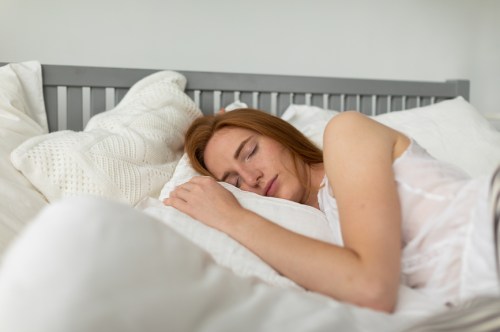Our editors independently select these products. Making a purchase through our links may earn Well+Good a commission
If you’re someone who tends to drop into sleep without barely any recollection of having laid your head on your pillow, you might consider yourself lucky. After all, struggling to fall asleep can be incredibly frustrating—not to mention anxiety-provoking, for some—and can contribute to both sleep loss and tiredness the next day. But, according to sleep doctors, falling asleep instantly isn’t always a totally innocuous blessing. In fact, the quick dip into sleep can be one of the sneakiest signs that your body is operating in a sleep-deprived state.
Experts in This Article
assistant professor in medicine at Harvard Medical School and associate scientist at the Brigham and Women’s Hospital
neurologist, sleep specialist, and author of The Sleep Solution
As with waking up, falling asleep requires a cascade of hormonal shifts. For starters, take “adenosine, which builds up in the brain throughout your daytime waking hours, and is what creates a drive to sleep, which is then enhanced by rising levels of melatonin as environmental light diminishes,” says neurologist W. Chris Winter, advisor for Sleep.com and author of The Sleep Solution: Why Your Sleep Is Broken and How To Fix It.
“Sleep latency ranges, but in healthy sleepers, it is somewhere between 15 and 30 minutes.” —Rebecca Robbins, PhD, sleep specialist
These physiological processes (as they unfold in a person with good sleep hygiene) take some time, meaning “falling asleep is not typically immediate,” says sleep specialist Rebecca Robbins, PhD, sleep expert at sleep-tech company Oura. “Sleep latency, which refers to the time it takes you to fall asleep, ranges, but in healthy sleepers, it is somewhere between 15 and 30 minutes.” And that timeframe is worth emphasizing, says Dr. Winter: “There’s really no need to strive for five minutes or be jealous of a bedmate who can fall asleep in 30 seconds.”
Why falling asleep instantly could be a sign of sleep deprivation
If you’re passing out on contact with your pillow, that likely means your brain is starved for sleep and is making all efforts to get as much of it as it can, says Dr. Robbins. To understand why, picture sleep loss like hunger: “If you sat down at a meal and had not eaten for 24 hours, would you not eat everything in sight as quickly as you could?” she asks.
In the case of sleep deprivation, the adenosine buildup in your brain noted above becomes greater and greater the more deprived you are, until it’s all you can do but to fall asleep stat. That same process can contribute to an ability to nap anytime, any place, too—which can also be “indicative of an issue related to inadequate sleep quantity, poor sleep quality, or both,” says Dr. Winter.
That said, if you find that you can fall asleep relatively swiftly—say, in a couple minutes, rather than 10 or 20—and you don’t suspect that you’re sleep-deprived, it is possible that your brain is just better at making the wake-to-sleep transition. One reason why? You might be a particularly effective stress-manager. “We suspect that people who practice mindfulness or meditation exercises that help train the brain to let go of worries and stressors from the day may be able to fall asleep a bit faster than individuals who do not practice these strategies,” says Dr. Robbins.
To determine whether your tendency to fall asleep instantly puts you in the sleep-deprived camp or the good-sleeper group, you can look for more effective metrics of sleep health than simply sleep latency—for example, being able to fall asleep and wake up naturally around the same time each day, says Dr. Robbins.
Similarly, if you’re able to easily stay awake in various circumstances where sleep could happen (but which aren’t meant for sleep), then falling asleep instantly at night is less likely to indicate a sleep issue, says Dr. Winter. “For example, consider reading a book in a quiet library, sitting on a plane, or attending a religious service or college lecture,” he says. “If you don’t feel like being in these situations would make it difficult for you to keep your eyes open, then your sleep quality and quantity are still likely okay.”
Even beyond that, it’s worth considering how you feel when you wake up in the morning, adds Dr. Robbins. If you’re falling asleep instantly and waking up feeling groggy or unrested, then there’s a far bigger chance that you’re experiencing some level of sleep deprivation. Whereas, waking up refreshed and satisfied is a very good sign that you’ve gotten sufficient quantity and quality of sleep, says Dr. Robbins—no matter how quickly you dozed off the night before.
Oh hi! You look like someone who loves free workouts, discounts for cutting-edge wellness brands, and exclusive Well+Good content. Sign up for Well+, our online community of wellness insiders, and unlock your rewards instantly.
Sign Up for Our Daily Newsletter
Get all the latest in wellness, trends, food, fitness, beauty, and more delivered right to your inbox.
Got it, you've been added to our email list.











